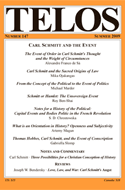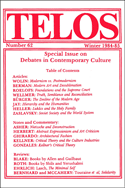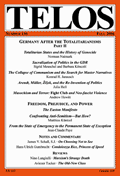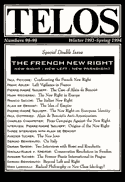By Beau Mullen · Friday, February 24, 2017
This paper focuses on the modern practice of using law, both national and international, to achieve policy goals and political ends that usually are the result of tactical military action. Lawfare, as this practice is referred to, is now a crucial tactic in the modern era of international relations, where war is largely carried out in a far from traditional manner. Lawfare, then, is a unique form of irregular warfare that can be employed by nations against one another and against insurgents in asymmetrical conflicts at home and abroad. This new reliance on irregular and asymmetrical warfare generally and lawfare specifically is reflective of Hegel’s view of the end of history, particularly as articulated by Alexandre Kojève. Basically, that as individuals gain equal recognition, the mode of satisfying desire will necessarily take the form of law and bureaucracy.
Continue reading →
By Beau Mullen · Tuesday, January 20, 2015  Central to Carl Schmitt’s geophilosophy is his view that law is intrinsically linked to the physical location. This connection between the terra firma and the law is an essential element of what he refers to as nomos. Schmitt sees this as the most authentic form of law, distinguishable from views that perceive law as a normative or positive regime. In his article “Carl Schmitt and the Sacred Origins of Law,” Mika Ojakangas elucidates Schmitt’s conception of nomos, its relation to Schmitt’s view of mythopolitical legitimization of the state, and the consequences of rejecting the notion of such a link by secularization. Central to Carl Schmitt’s geophilosophy is his view that law is intrinsically linked to the physical location. This connection between the terra firma and the law is an essential element of what he refers to as nomos. Schmitt sees this as the most authentic form of law, distinguishable from views that perceive law as a normative or positive regime. In his article “Carl Schmitt and the Sacred Origins of Law,” Mika Ojakangas elucidates Schmitt’s conception of nomos, its relation to Schmitt’s view of mythopolitical legitimization of the state, and the consequences of rejecting the notion of such a link by secularization.
Continue reading →
By Beau Mullen · Friday, March 7, 2014 As an occasional feature on TELOSscope, we highlight a past Telos article whose critical insights continue to illuminate our thinking and challenge our assumptions. Today, Beau Mullen looks at Gabriella Slomp’s “Thomas Hobbes, Carl Schmitt, and the Event of Conscription” from Telos 147 (Summer 2009).
 As Gabriella Slomp points out in the opening of her article “Thomas Hobbes, Carl Schmitt, and the Event of Conscription,” scholars are split on how to view the relationship between Hobbes and Schmitt. Some see Schmitt as Hobbes’s heir apparent, while others think that Schmitt’s thinking is in fact a rejection of much of Hobbes’s work. Both thinkers emphasize man’s warlike nature, they hold that the state exists to protect men from violent death at the hands of other men, and they maintain that a strong state with unlimited power is best suited to this aim. Both agree that man has an obligation to the state that is reciprocal to the duty of the state to provide security. In this piece, Slomp examines both Schmitt’s and Hobbes’s views of the extent of this obligation and comes to the conclusion that the two are in fact in disagreement. Using their writings on conscription, Slomp reveals that Hobbes has much more concern for the sovereignty of the individual whereas Schmitt never wavers in his affording primacy to the group or state. As Gabriella Slomp points out in the opening of her article “Thomas Hobbes, Carl Schmitt, and the Event of Conscription,” scholars are split on how to view the relationship between Hobbes and Schmitt. Some see Schmitt as Hobbes’s heir apparent, while others think that Schmitt’s thinking is in fact a rejection of much of Hobbes’s work. Both thinkers emphasize man’s warlike nature, they hold that the state exists to protect men from violent death at the hands of other men, and they maintain that a strong state with unlimited power is best suited to this aim. Both agree that man has an obligation to the state that is reciprocal to the duty of the state to provide security. In this piece, Slomp examines both Schmitt’s and Hobbes’s views of the extent of this obligation and comes to the conclusion that the two are in fact in disagreement. Using their writings on conscription, Slomp reveals that Hobbes has much more concern for the sovereignty of the individual whereas Schmitt never wavers in his affording primacy to the group or state.
Continue reading →
By Beau Mullen · Wednesday, January 22, 2014 As an occasional feature on TELOSscope, we highlight a past Telos article whose critical insights continue to illuminate our thinking and challenge our assumptions. Today, Beau Mullen looks at Martin Jay’s “Hierarchy and the Humanities: The Radical Implications of a Conservative Idea” from Telos 62 (Winter 1984).
 The notion of “high culture” has been under attack in different ways by critics, academics, and the general public for generations. Moreover, as Western culture becomes increasingly commercialized, egalitarian impulses have exiled much of what was considered by many to be high culture to obscurity, appreciated mainly by a minority who are themselves regarded as cultural elitists. Popular or mass culture appears to now reign supreme, but this does not mean that cultural hierarchy has been brought to an end. Cultural hierarchy still has its defenders, and as Martin Jay suggests in his 1984 Telos article “Hierarchy and the Humanities: The Radical Implications of a Conservative Idea,” it clearly has a place in current cultural evaluations. The notion of “high culture” has been under attack in different ways by critics, academics, and the general public for generations. Moreover, as Western culture becomes increasingly commercialized, egalitarian impulses have exiled much of what was considered by many to be high culture to obscurity, appreciated mainly by a minority who are themselves regarded as cultural elitists. Popular or mass culture appears to now reign supreme, but this does not mean that cultural hierarchy has been brought to an end. Cultural hierarchy still has its defenders, and as Martin Jay suggests in his 1984 Telos article “Hierarchy and the Humanities: The Radical Implications of a Conservative Idea,” it clearly has a place in current cultural evaluations.
Continue reading →
By Beau Mullen · Tuesday, December 10, 2013 As an occasional feature on TELOSscope, we highlight a past Telos article whose critical insights continue to illuminate our thinking and challenge our assumptions. Today, Beau Mullen looks at Norman Naimark’s “Totalitarian States and the History of Genocide” from Telos 136 (Fall 2006).
 The twentieth century was witness to no shortage of political violence and mass death perpetrated by the state. The two most well-known genocides of the century—those that occurred under the rule of Nazi Germany and the Stalinist Soviet Union—did not occur because the state broke down and lawlessness prevailed. Quite the contrary: both regimes had complete control over their citizenry, and the apparatus of government was used to make the butchery as efficient and as inescapable as possible. Both regimes were characterized by extreme violence and terror, key elements of the totalitarian system as defined by Hannah Arendt, so it seems only logical that totalitarianism increases the potential for genocide. The twentieth century was witness to no shortage of political violence and mass death perpetrated by the state. The two most well-known genocides of the century—those that occurred under the rule of Nazi Germany and the Stalinist Soviet Union—did not occur because the state broke down and lawlessness prevailed. Quite the contrary: both regimes had complete control over their citizenry, and the apparatus of government was used to make the butchery as efficient and as inescapable as possible. Both regimes were characterized by extreme violence and terror, key elements of the totalitarian system as defined by Hannah Arendt, so it seems only logical that totalitarianism increases the potential for genocide.
Continue reading →
By Beau Mullen · Tuesday, September 10, 2013 As an occasional feature on TELOSscope, we highlight a past Telos article whose critical insights continue to illuminate our thinking and challenge our assumptions. Today, Beau Mullen looks at Alain de Benoist’s “The Idea of Empire,” from Telos 98–99 (Winter 1993/Spring 1994).
 Few political concepts have appeared as destined to be cast into history’s dustbin as that of empire. The nation-state is the most widely accepted model for sovereign territories, and imperial ambitions of nations are often condemned by the international community. The existence of great empires, such as that of the Romans or of the Holy Roman Empire, it appears, are simply regimes that are relics of a distant, less enlightened historical era. The areas once encompassing the great empires have now fractured into sovereign nation-states, each with its own polity and allegiances. Furthermore, serious modern confederation between nations is most often based on monetary concerns, not the furtherance of any imperial goal or ambition. The sun, it could be said, has set on the idea of empire. Few political concepts have appeared as destined to be cast into history’s dustbin as that of empire. The nation-state is the most widely accepted model for sovereign territories, and imperial ambitions of nations are often condemned by the international community. The existence of great empires, such as that of the Romans or of the Holy Roman Empire, it appears, are simply regimes that are relics of a distant, less enlightened historical era. The areas once encompassing the great empires have now fractured into sovereign nation-states, each with its own polity and allegiances. Furthermore, serious modern confederation between nations is most often based on monetary concerns, not the furtherance of any imperial goal or ambition. The sun, it could be said, has set on the idea of empire.
Continue reading →
|
|
 Central to Carl Schmitt’s geophilosophy is his view that law is intrinsically linked to the physical location. This connection between the terra firma and the law is an essential element of what he refers to as nomos. Schmitt sees this as the most authentic form of law, distinguishable from views that perceive law as a normative or positive regime. In his article “Carl Schmitt and the Sacred Origins of Law,” Mika Ojakangas elucidates Schmitt’s conception of nomos, its relation to Schmitt’s view of mythopolitical legitimization of the state, and the consequences of rejecting the notion of such a link by secularization.
Central to Carl Schmitt’s geophilosophy is his view that law is intrinsically linked to the physical location. This connection between the terra firma and the law is an essential element of what he refers to as nomos. Schmitt sees this as the most authentic form of law, distinguishable from views that perceive law as a normative or positive regime. In his article “Carl Schmitt and the Sacred Origins of Law,” Mika Ojakangas elucidates Schmitt’s conception of nomos, its relation to Schmitt’s view of mythopolitical legitimization of the state, and the consequences of rejecting the notion of such a link by secularization.  The notion of “high culture” has been under attack in different ways by critics, academics, and the general public for generations. Moreover, as Western culture becomes increasingly commercialized, egalitarian impulses have exiled much of what was considered by many to be high culture to obscurity, appreciated mainly by a minority who are themselves regarded as cultural elitists. Popular or mass culture appears to now reign supreme, but this does not mean that cultural hierarchy has been brought to an end. Cultural hierarchy still has its defenders, and as Martin Jay suggests in his 1984 Telos article “Hierarchy and the Humanities: The Radical Implications of a Conservative Idea,” it clearly has a place in current cultural evaluations.
The notion of “high culture” has been under attack in different ways by critics, academics, and the general public for generations. Moreover, as Western culture becomes increasingly commercialized, egalitarian impulses have exiled much of what was considered by many to be high culture to obscurity, appreciated mainly by a minority who are themselves regarded as cultural elitists. Popular or mass culture appears to now reign supreme, but this does not mean that cultural hierarchy has been brought to an end. Cultural hierarchy still has its defenders, and as Martin Jay suggests in his 1984 Telos article “Hierarchy and the Humanities: The Radical Implications of a Conservative Idea,” it clearly has a place in current cultural evaluations.  The twentieth century was witness to no shortage of political violence and mass death perpetrated by the state. The two most well-known genocides of the century—those that occurred under the rule of Nazi Germany and the Stalinist Soviet Union—did not occur because the state broke down and lawlessness prevailed. Quite the contrary: both regimes had complete control over their citizenry, and the apparatus of government was used to make the butchery as efficient and as inescapable as possible. Both regimes were characterized by extreme violence and terror, key elements of the totalitarian system as defined by Hannah Arendt, so it seems only logical that totalitarianism increases the potential for genocide.
The twentieth century was witness to no shortage of political violence and mass death perpetrated by the state. The two most well-known genocides of the century—those that occurred under the rule of Nazi Germany and the Stalinist Soviet Union—did not occur because the state broke down and lawlessness prevailed. Quite the contrary: both regimes had complete control over their citizenry, and the apparatus of government was used to make the butchery as efficient and as inescapable as possible. Both regimes were characterized by extreme violence and terror, key elements of the totalitarian system as defined by Hannah Arendt, so it seems only logical that totalitarianism increases the potential for genocide.  Few political concepts have appeared as destined to be cast into history’s dustbin as that of empire. The nation-state is the most widely accepted model for sovereign territories, and imperial ambitions of nations are often condemned by the international community. The existence of great empires, such as that of the Romans or of the Holy Roman Empire, it appears, are simply regimes that are relics of a distant, less enlightened historical era. The areas once encompassing the great empires have now fractured into sovereign nation-states, each with its own polity and allegiances. Furthermore, serious modern confederation between nations is most often based on monetary concerns, not the furtherance of any imperial goal or ambition. The sun, it could be said, has set on the idea of empire.
Few political concepts have appeared as destined to be cast into history’s dustbin as that of empire. The nation-state is the most widely accepted model for sovereign territories, and imperial ambitions of nations are often condemned by the international community. The existence of great empires, such as that of the Romans or of the Holy Roman Empire, it appears, are simply regimes that are relics of a distant, less enlightened historical era. The areas once encompassing the great empires have now fractured into sovereign nation-states, each with its own polity and allegiances. Furthermore, serious modern confederation between nations is most often based on monetary concerns, not the furtherance of any imperial goal or ambition. The sun, it could be said, has set on the idea of empire. 






